Dozekh and Mughal Baccha play out clash of ego between Naulasi and Umdah, and Kale Mian and Gori Bi
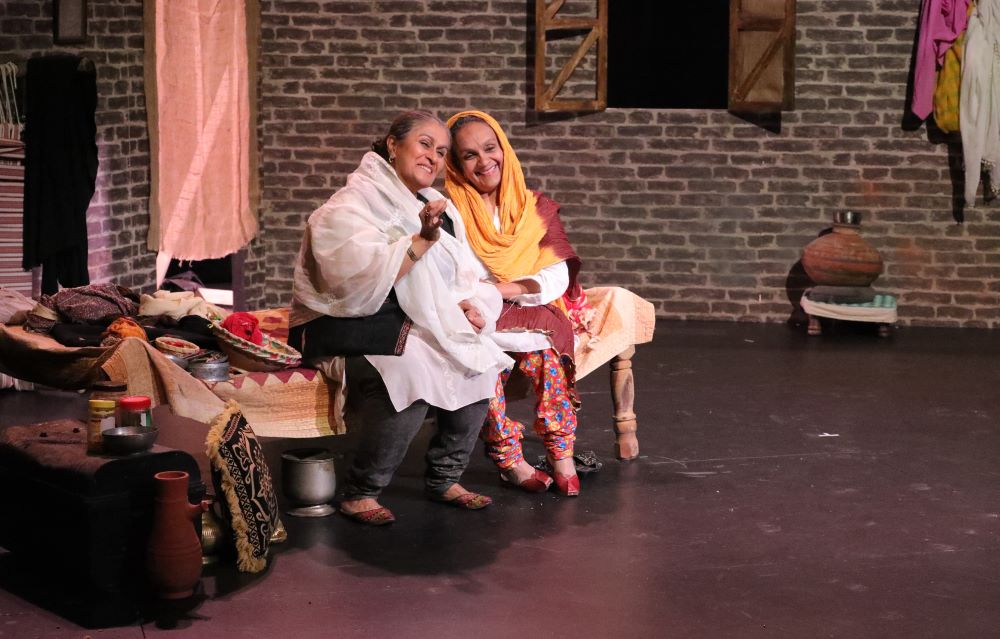
By Neena Badhwar
Naulasi (played by Saba Zaidi Abdi) and Umdah Khanum (Bobby Mallick) are two old ladies living a lonely life in a little room which they have rented. Life is dull yet they give each other company, at times remembering their good old days, or getting on each other’s nerves thus passing their day. They fight, they quarrel, and then they make up by sharing a ‘paan’ which the elder Naulasi offers with a lot love and humility forgetting that few moments ago they were at each other’s neck to the point of raising sandals and threatening to hit. They share some fond memories but also talk about how they have been through thick and thin when Umdah Khanum lost her son and when Naulasi herself had fallen gravely sick.
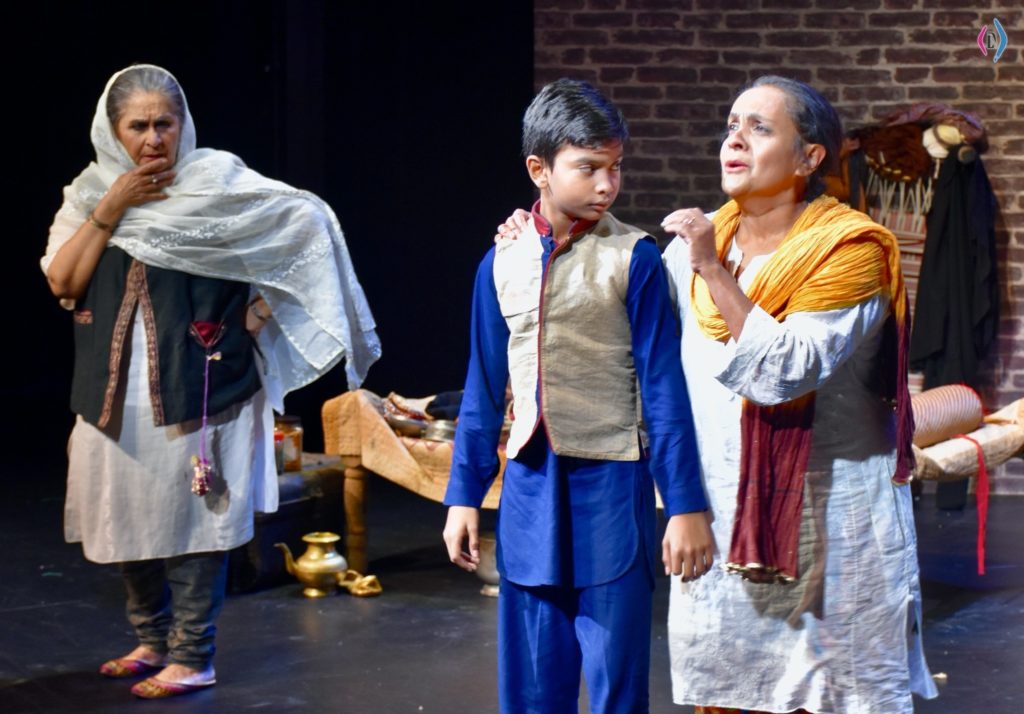
Play ‘Dozakh’ by the well-known yesteryear writer Ismat Chughtai staged by Adakar Theatre on July 23, 2022, depicts the dilemma of ageing through the two ladies living lonely life as the world goes by around them. Only occasionally they get respite when the next door boy (Abhishek Gupta ) comes looking for his lost ball. He is naughty and is a source of entertainment for the two as they both vie for his attention, a bright spark in their otherwise mundane life. Each draws ‘Lalla’ to her side but he is too agile pushing and shoving them no end. They both enjoy getting his attention even when being pushed around. Naulasi and Umdah both try their best to lure him by telling stories offering him little treats when his mum (Nisha Thacker) comes in to take him away. Otherwise their day is spent just looking out of the window to watch passers go by. Any little noise, bird sound is a source of intrigue to start off a conversation between the two.
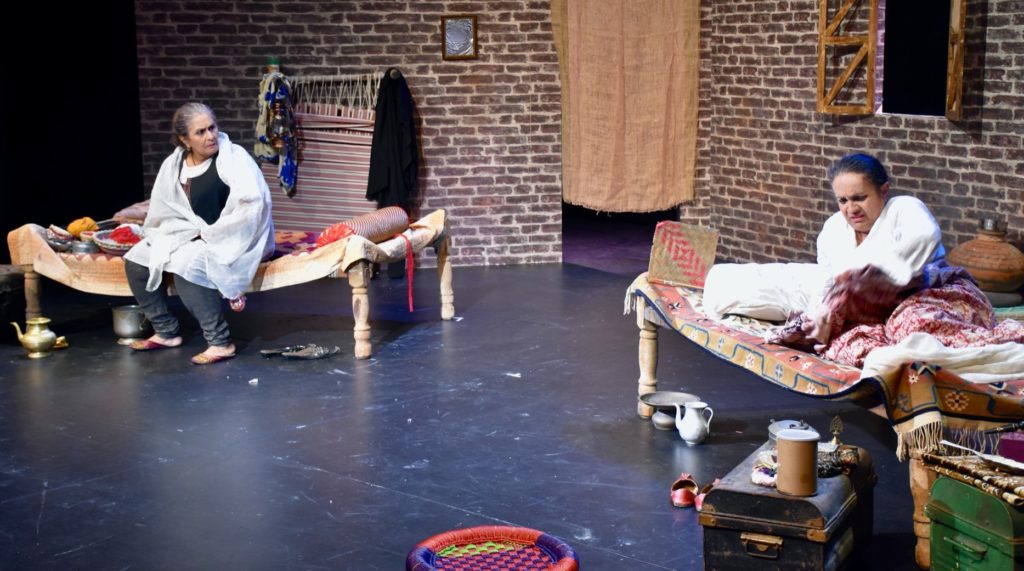
Naulasi and Umdah make an entertaining duo. Their dialogues carry crass humour, digging at each other, carrying witty repartees, full of memories both good and bad. Every delivery and every scene is a look in into their past life which has seen its ups and its down. You are privy to their sparse room, each with their own bed, a little island of sorts, having collected all their belongings around them, a spittoon lying underneath their bed, a trunk sits nearby with knick knacks, medicines, favourite snacks and some sentimental momentoes of their lives that they are not able to part with.
Saba delivers her dialogues with sharp witticism, that can be quite cutting at times. She can also be wily. She nudges Bobby’s Umdah who gets easily provoked. Then again Naulasi can be little humble when under the threat of being left alone.
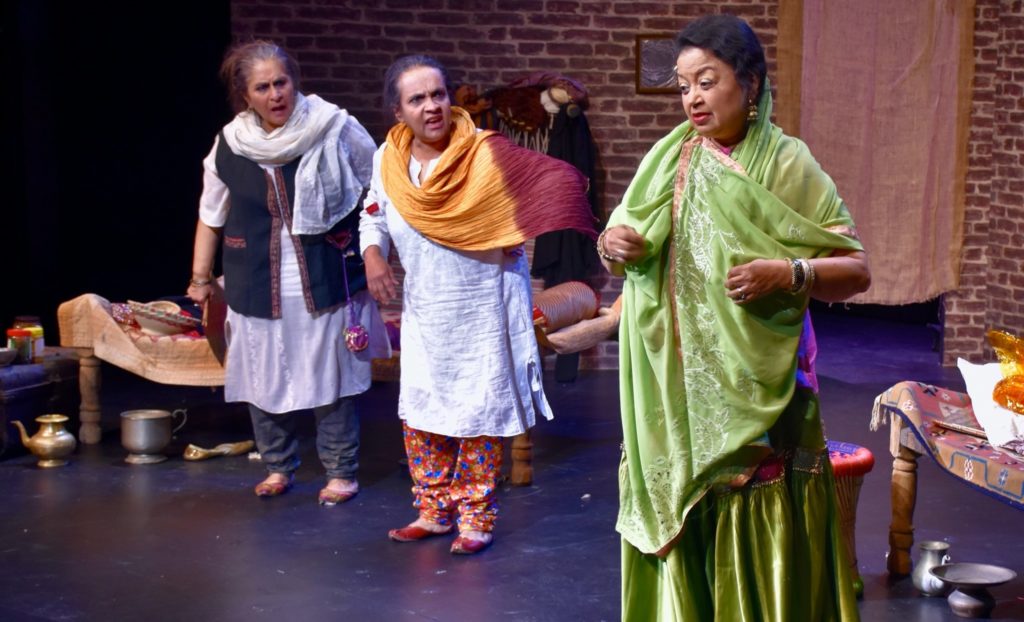
Things come to boil when Khairen (played by Aditi Dey) turns up, a young relative, when she tries to separate the two by offering a place in her home to Umdah Khanum who has had it with the constant bickering by Naulasi as she packs up her meagre belongings, in huff and puff, into a ‘potli- sack’. No more living with frustratingly Naulasi. But Khairen has her own selfish agenda up her sleeve. Naulasi fearful of being left alone is when Saba changes her demeanor like a chameleon. She begs seeking sympathy. Umdah gives in and sticks up for the lonely Naulasi. It is sad to see lonely life, their acting evokes, deep emotions that surface for all those who can empathise with the two ladies. The strength of drama lies in theatrics the two create with the volley of deliveries which brought many laughs, the pain of bad patches of their lives that surface when they cry remembering them. Lighting and stage set is simple yet with every item displayed around them has its own tale to tell.
Khairen is conveniently selfish as she looks up for her ‘Mumani – Aunty’ first in Naulasi and then in Umdah who turns out to be her actual aunt. The scene they create by crying over each other’s shoulder was simply hilarious. She changes from that loving relative to the one into an angry one leaving them to rot in hell, the metaphorical ‘dozakh’ here described as old age.
Saba has directed Dozekh with aplomb, a play that took more than year to finally be staged due of course to Covid-19. Three performances finally at NIDA’s Art Theatre bring in a hall full audience who appreciate the two plays.
Dozekh was personally given to Saba by Chughtai who she refers to her as ‘Ismat Apa’ ‘ – the script she acquired 40 years ago when she produced it for Door Darshan.
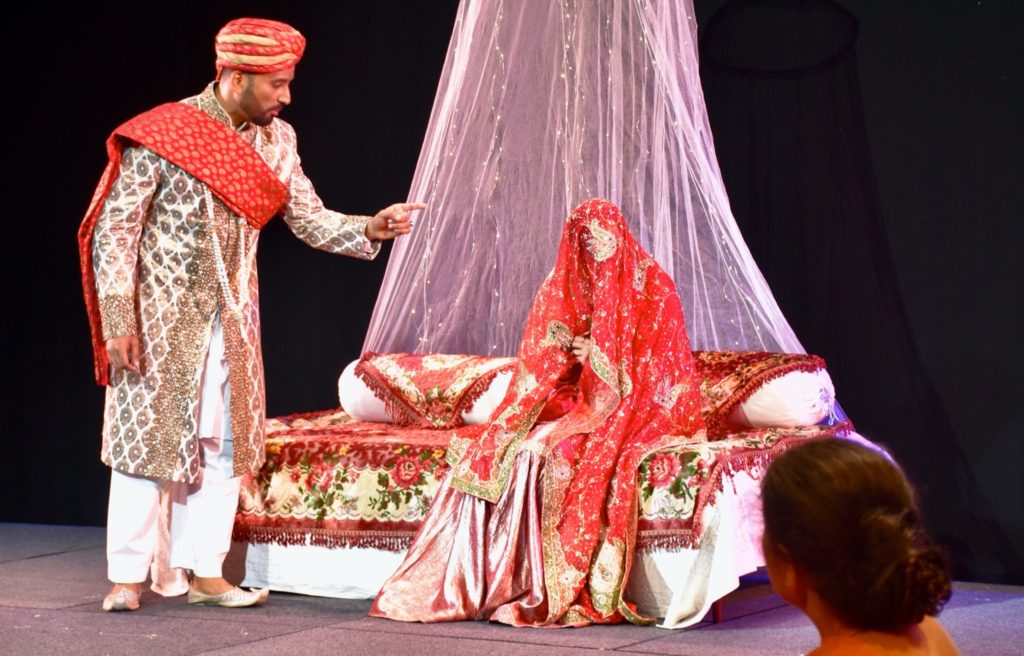
Second play that followed was Chughtai’s ‘Mughal Baccha’ – adapted by Danish Iqbal set in Fatehpur Sikri – story that writer remembers as a child is about two a Kale Mian (Akshat Gupta) and Gori Bi (Zara Khan as young bride and Abida Malik as the old Gori Bi) in the backdrop of the dying days of Mughal empire that had seen better days now under foreign rule. The Nawabs and their families fending for themselves slowly receding into penury of a glory that once was.
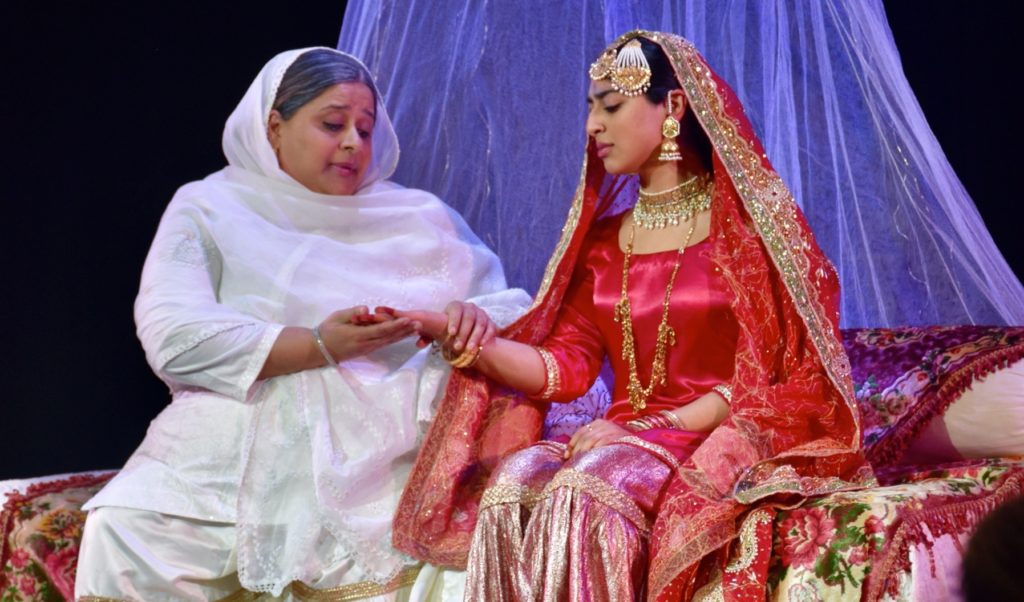
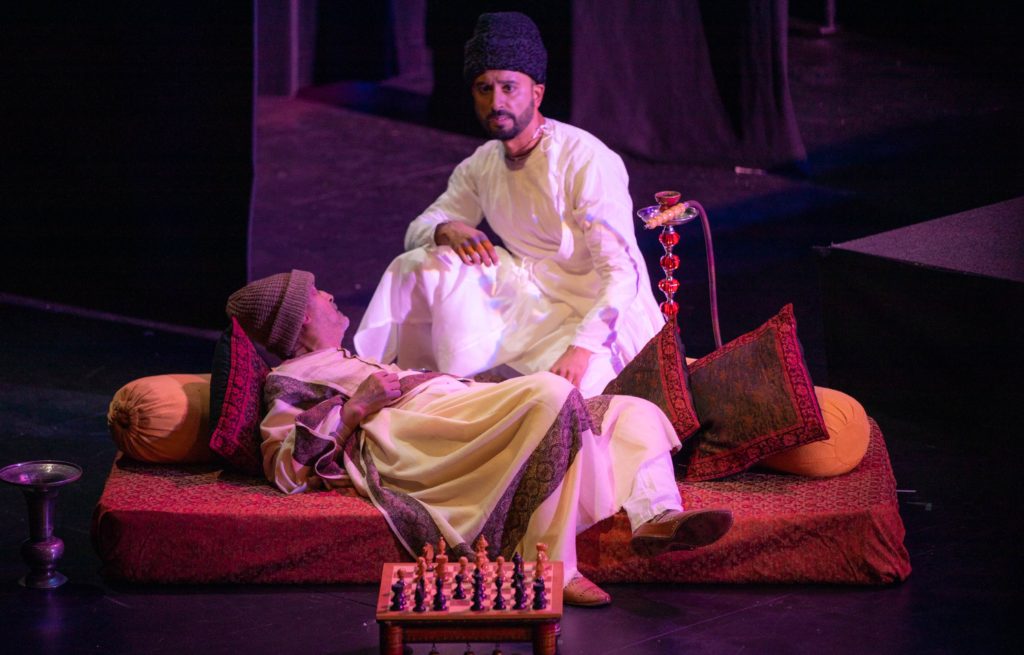
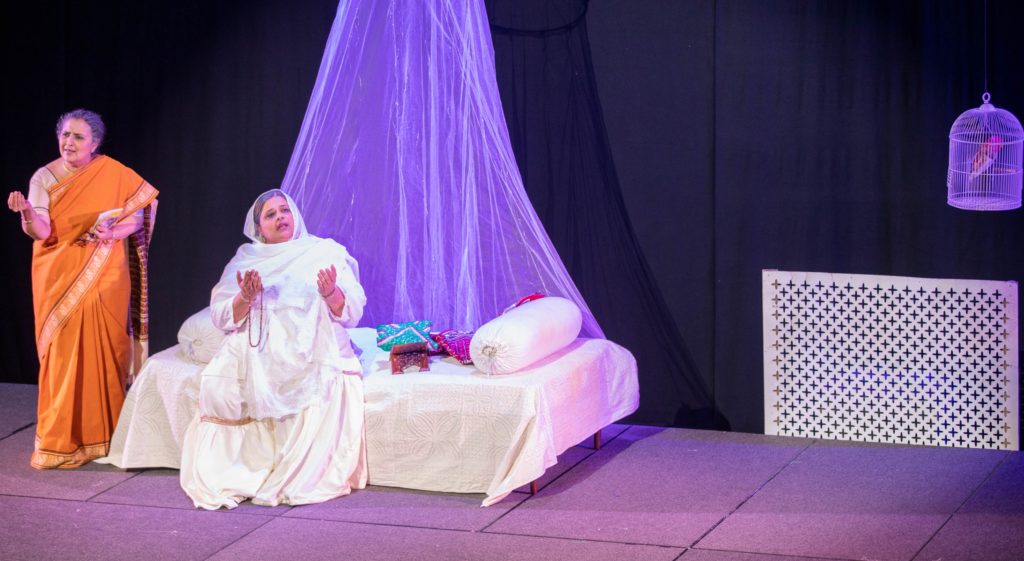
Aparna Tijoriwala as Ismat Chughtai, the writer, narrates the story of Kale Mian and Gori Bi making it an interesting play with scenes that depict the clash of egos between the two main characters. ‘Kale Mian’ as the Nawab played by Akshat Gupta is high headed who knows only to order his young scared bride to lift her ‘veil’ which she doesn’t as the ceremony demands. She does not lift her veil whenever she is visited by the so-called husband of hers and nor does the egotistical Nawab give in, a lifetime goes by thus. The ego on both the character’s parts makes it the gist of the play, ‘Kale Mian’ with his stubbornness and ‘Gori Bi’ just a confused bride who waits at her father’s home for her husband to take her away in the ‘rukhsati’ which never ever happens.
Kale Mian dies without seeing his wife while ‘Gori Bi’ who lives in limbo, gone grey and old, stuck in time for ever. She is reduced to living off by selling her jewellery one by one. ‘Mughal Baccha’ is a different play to ‘Dozakh’ and gives glimpses into the lives of Muslim families of that bygone era. Akshat as Kale Mian acts as the egotistical groom, upright, proud, ordering Gori Bi, the two never ever consummating their marriage. He acts well whereas Gori Bi – by Zara and Abdia both impress as the fair complexion beauty, never to lift their ‘veil’ when commanded by the husband. Maids making fun of Kale Mian who is dark complexioned compared to the fair Gori Bi, victim of a prejudice that we carry in Asia to do with skin colour.
The stage was impressive and simple. Costumes ranged using royal apparel of Mughal era with shararas, jewellery and trinkets. Kale Mian carries an expensive shawl over his shoulders with an upright posture resplendent of a Mughal prince.
Chughtai’s pen and Saba’ Abdi’s direction made the story of ‘Mughal Baccha’ quite interesting. Why ‘Kale Mian’ behaved the way he did and why ‘Gori Bi’ stayed a virgin till the very end, is something one wonders afterwards. Music to suit the moods has been created by local Sydney artists to highlight the effects of the scenes that come one after the other, the wedding scene as well as the ones that depict the death of Kale Mian. Art direction of Dhruvjyoti Ghosh and music by Sumati Krishnan, sound by Tushar Ghosh and costumes designed by Saba Zaidi Abdi, made the scenes impressive and worth a watch.
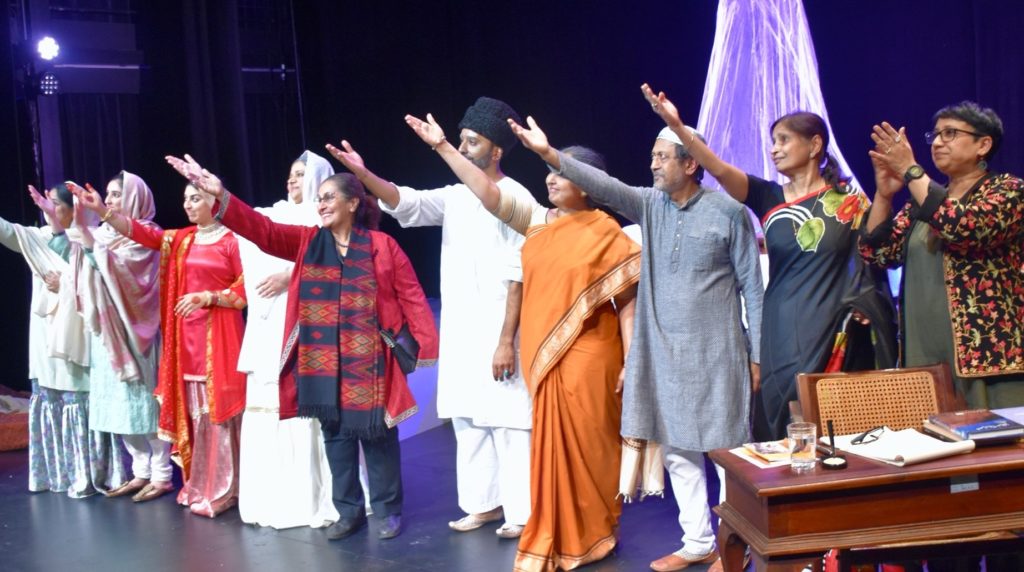
Adakar Theatre & Cultural Group by Saba Zaidi Abdi has brought these two plays that adds another feather in its cap. Good choice of scripts. Presenting Ismat Chughtai’s plays that played out the stark universal reality of ageing anywhere in the world and of an end of an old era of Mughal Khandaans. Using young Sydney actors was an added attraction that the talent is growing right here, thanks to Adakar.
Pics by: Naseem Khan and Harmohan Walia
Short URL: https://indiandownunder.com.au/?p=18214
